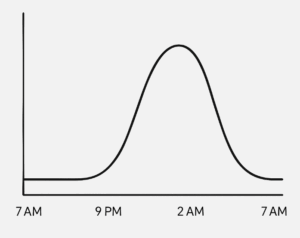The Natural Rhythm of Melatonin: Your Body’s Biological Night Signal
 When the sun goes down, your brain has its own way of telling you it’s time to wind down. That signal is melatonin—a hormone secreted by the pineal gland under the direction of the body’s master clock, the suprachiasmatic nucleus (SCN). Melatonin doesn’t knock you out like a sedative. Instead, it whispers to the rest of your system: “It’s night. Start preparing for sleep.”
When the sun goes down, your brain has its own way of telling you it’s time to wind down. That signal is melatonin—a hormone secreted by the pineal gland under the direction of the body’s master clock, the suprachiasmatic nucleus (SCN). Melatonin doesn’t knock you out like a sedative. Instead, it whispers to the rest of your system: “It’s night. Start preparing for sleep.”
The 24-Hour Dance of Melatonin
Melatonin follows a daily cycle—low during the day, rising at night, and tapering off by morning. Scientists call this rhythm circadian, meaning “about a day.” Here’s how it usually plays out:
-
Daytime (7 am – 7 pm): Levels remain minimal. Bright light tells the SCN to keep melatonin quiet.
-
Evening Onset (around 9–10 pm): As natural light fades, melatonin production rises. This point, known as the Dim Light Melatonin Onset (DLMO), is one of the most reliable markers of your internal clock.
-
Night Peak (2–4 am): Melatonin reaches its highest levels. Your core body temperature dips, metabolism slows, and the brain consolidates memory during sleep.
-
Morning Decline (5–7 am): With sunrise or artificial light, melatonin secretion rapidly drops, allowing wakefulness to return.
Why the Rhythm Matters
This rhythm helps synchronize nearly every biological process—sleep, metabolism, hormone release, even immune function. When melatonin’s rhythm is disrupted, such as by late-night screen use, jet lag, or shift work, the downstream effects can ripple across both mind and body.
Practical Takeaways
-
Light is the switch: Bright light at night suppresses melatonin; natural morning light helps reset its cycle.
-
Consistency matters: Going to bed and waking up at regular times strengthens the rhythm.
-
Supplements aren’t shortcuts: While melatonin tablets can help in some situations (jet lag, certain sleep disorders), they don’t replace the body’s finely tuned natural cycle.
Melatonin isn’t a sleeping pill—it’s a timekeeper. Respecting its rhythm often means better sleep, steadier mood, and sharper health overall.
About the Author
I’m Dr. Srinivas Rajkumar T, MD (AIIMS, New Delhi), Consultant Psychiatrist based in Chennai. Through my clinical practice and writing, I aim to make psychiatry more understandable and less intimidating.
📍 Mind and Memory Clinic, Apollo Clinic, Velachery, Chennai (Opp. Phoenix Mall)
📞 +91 85951 55808
🌐 srinivasaiims.com